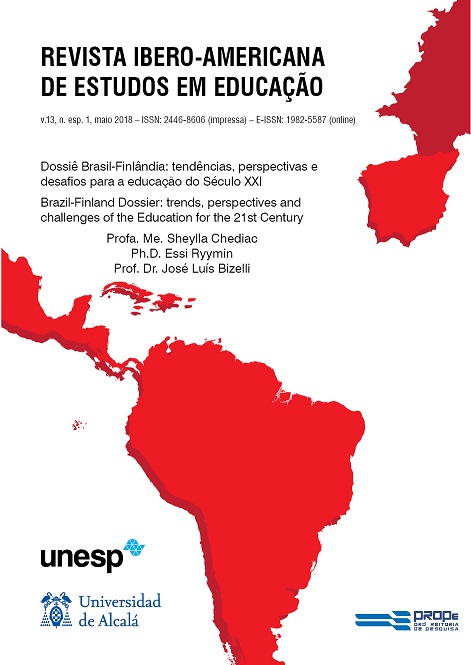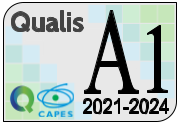Criação de conhecimento autogerido e dialógico para promover a aprendizagem profunda: o caso piloto na formação de professores
DOI:
https://doi.org/10.21723/riaee.nesp1.v13.2018.11386Palavras-chave:
Aprendizagem autogerida, Criação de conhecimento dialógico, Aprendizagem profunda, Formação de professores.Resumo
A educação está sendo desafiada através da revolução sócio digital; o mundo tornou-se socialmente conectado e a tecnologia oferece novas oportunidades para o aprendizado. Com base nos estudos anteriores e nas experiências de pilotagem, a necessidade de um novo design de aprendizagem é clara. Neste artigo, enfatizamos que é importante incluir a aprendizagem autogerida como parte do processo dialógico de criação de conhecimento colaborativo, devido à internalização individual de conhecimentos e habilidades. O artigo é um breve relatório sobre os resultados profundos de aprendizagem de alunos-professores (n = 27) através de um novo projeto de aprendizagem pedagógica. Inicialmente, algumas indicações mostraram que o trabalho autogerido aprofunda as conquistas, bem como a criação de conhecimento colaborativo dialógico. Os artefatos criados nos círculos de estudo incluíam sinais de aprendizado profundo alcançados através do processo de 4 fases. As experiências da pilotagem estimulam o pensamento sobre novas etapas de desenvolvimento para o design da criação de um processo de conhecimento colaborativo, autogerido e dialógico. É também necessário desenvolver processos de aprendizagem transparentes, onde o conhecimento e a tecnologia tem sido identificados como críticos para a compreensão do futuro da formação de professores.
Downloads
Referências
AARNIO, H. Oppijalähtöisyyttä ja yhteisöllisyyttä tietoverkkoja ja verkostoja hyödyntävään oppimiseen – Tutkimustuloksia DIANA-klinikalta [Enhancing learner-centredness and collaboration in learning online and in networks – Results from DIANA clinic]. Saarijärvi, Finland: Saarijärven Offset, 2006.
AARNIO, H.; ENQVIST, J. Dialoginen oppiminen verkossa – DIANA-malli ammatillisen osaamisen rakentamiseen [Dialogic Learning on the Net - DIANA model for construction of professional competence]. Helsinki: Hakapaino Oy, 2001.
AARNIO, H. Dialogical methods. Retrieved from: http://www3.hamk.fi/dialogi/diale/methods. Access in: 10 mar. 2018.
AARNIO, H.; ENQVIST, J. Diana-mallistako kehys digiajan oppimiselle [DIANA model – A framework for learning in the digital age?]. Ammattikasvatuksen aikakauskirja, v. 18, n. 3, p. 38–49, 2016.
AARNIO, M. Collaborative knowledge construction in the context of problem-based learning: exploring learning from conflicting ideas and knowledge (Doctoral dissertation). University of Helsinki, Institute of Behavioural Science. Helsinki, Finland: Unigrafia, 2015.
ANDERSON, L.W.; KRATHWOHL, D. R.; AIRASIAN, P. W.; CRUIKSHANK, K. A.; MAYER, R. E.; PINTRICH, P. R.; RATHS, J.; WITTROCK, M. C. (Edts.). A taxonomy for learning, teaching, and assessing: a revision of Bloom’s Taxonomy of Educational Objectives (Complete edition). New York: Longman, 2001.
BEN-ZVI, D.; SFARD, A. Ariadne’s thread, Daedalus’ wings and the learners’ autonomy. Education & Didactique 1, p. 117–134, 2007.
BEREITER, C. Education and Mind in the Knowledge Age. Mahwah NJ, Lawrence Erlbaum Associates, 2002.
BIGGS, J.; TANG, C. Teaching for quality for learning at university. New York, USA: Open University Press, 2011.
BOHM, D. On dialogue. London: Routledge, 2004.
BOUND, H. Developing Online Dialogue: dialogical Inquiry. International Journal of Teaching and Learning in Higher Education, v. 22, n. 2, p. 107–119, 2010.
CHO, M-H.; RATHBUN, G. Implementing teacher-centred online teacher professional development (oTPD) programme in higher education: a case study. Innovations in Education and Teaching International, v. 50, n. 2, p. 144–156, 2013. DOI:10.1080/14703297.2012.760868.
ENGESTRÖM, Y.; TOIVIAINEN, H. Co-configurational design of learning instrumentalities: an activity-theoretical perspective. In: LUDVIGSEN, S. R.; LUND, A.; RASMUSSEN I.; SÄLJÖ, R. (Eds.). Learning across sites: New tools, infrastructures and practices. Oxon: Routledge, 2011, p. 33-52.
ENQVIST, J.; AARNIO, H. DIANA Model – Dialogical Authentic Learning on the Net. In: Proceedings of ED-MEDIA 2003 - World Conference on Educational Multimedia, Hyper-media & Telecommunications. Honolulu, Hawaii, USA; June 23–28, 2003, p. 2090-2095. AACE.
ENQVIST, J.; AARNIO, H. Crucial dialogic actions in co-constructive knowledge creation in online learning environment. In: CANTONI, L.; MCLOUGHLIN, C. (Eds.). World Conference on Educational Multimedia, Hypermedia & Telecommunications, june 21-26, 2004, Lugano, Switzerland, p. 2576–2583. Proceedings of ED-MEDIA 2004 [CD-ROM]. AACE.
GIBSON, D. Assessing deeper learning in open online learning communities. In: MCBRIDE, R.; SEARSON, M. (Eds.). Proceedings of Society for Information Technology & Teacher Education international conference 2013. Chesapeake, VA: AACE, p. 459-465.
GUILAR, J. D.; LORING, A. (2008). Dialogue and Community in Online Learning: Lessons from Royal University. Journal of Distance Education, v. 22, n. 3, p. 19–40, 2008.
HAMK School of Professional Teacher Education. Opinto-opas. Study guide 2017–2018.
ISAACS, W. Dialogue and the Art of Thinking Together. A Pioneering Approach to Communicating in Business and in Life. New York: Currency, 1999.
MERCER, N.; HOWE, C. Explaining the dialogic process of teaching and learning: the value and potential sociocultural theory. Learning, Culture and Social Interaction, v. 1, p. 12–21, 2012.
NÄYKKI, P. Affective and effective collaborative learning: process-oriented design studies in a teacher education context. Academic dissertation. University of Oulu, Finland. Tampere, Finland: Juvenes Print, 2014.
RUHALAHTI, S.; KORHONEN, A.-M.; RASI, P. Authentic, dialogical knowledge construction: a blended and mobile teacher education programme. Educational Research, v. 59, n. 4, 2017. DOI: 10.1080/00131881.2017.1369858
RUHALAHTI, S.; AARNIO, H.; RUOKAMO, H. Evaluation of deep learning in teacher education: conducted on the principles of authentic and collaborative knowledge construction as proposed by the DIANA model. [in press].
RYAN, R. M.; DECI, E. L. Intrinsic and extrinsic motivations: Classic definitions and new directions. Contemporary Educational Psychology, v. 25, n. 1, p. 54-67, 2000.
SFARD, A. On two metaphors of learning and the dangers of choosing just one. Educational Researcher, v. 27, n. 2, p. 4–13, 1998.
SFARD, A. When the rules of discourse change, but nobody tells you: making sense of mathematics learning from a commognitive standpoint. Journal for Learning Sciences, v. 16, n. 4, p. 567–615, 2007.
SMITH, T. W.; COLBY, S. A. Teaching for deep learning. The Clearing House. A Journal of Educational Strategies, Issues and Ideas, v. 80, n. 5, p. 205–210, 2007.
TULLIS, J. G.; BENJAMIN, A. S. On the effectiveness of self-paced learning. Journal of Memory and Language, v. 64, p. 109–118, 2011. DOI: 10.1016/j.jml.2010.11.002.
VYGOTSKY, L. S. Mind in Society. Cambridge Massachussets: Harvard University Press, 1978.
WEGERIF, R. A dialogic understanding of the relationship between CSCL and teaching thinking skills. International Journal of Computer-supported Collaborative Learning, v. 1, p. 143–157, 2006.
WENGER, E. Communities of practice. Learning, meaning and identity. Cambridge: Cambridge University Press, 1998.
Downloads
Publicado
Como Citar
Edição
Seção
Licença
Manuscritos aceitos e publicados são de propriedade dos autores com gestão da Ibero-American Journal of Studies in Education. É proibida a submissão total ou parcial do manuscrito a qualquer outro periódico. A responsabilidade pelo conteúdo dos artigos é exclusiva dos autores. A tradução para outro idioma é proibida sem a permissão por escrito do Editor ouvido pelo Comitê Editorial Científico.








